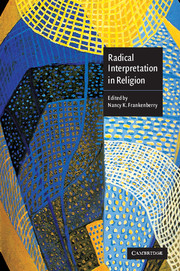Book contents
Introduction
Published online by Cambridge University Press: 13 November 2009
Summary
The chapters in Part III have in common a concern with the semantics of religious belief. Hans Penner explores the flight from the literal meaning of myths and rituals, Nancy K. Frankenberry critiques the very idea of the metaphorical or symbolic meaning of religious propositions, and Jonathan Z. Smith presents “manna” and “mana” as two “false friends” whose case histories illustrate the perils of interpreting believers among Hebrews and Durkheimians alike.
As a Hindologist and historian of religions, Penner's longstanding interest in methodological impasses and theoretical resolutions is well known. As a radical voice in the academic study of religion, he has dissented from theologically motivated interpretations of myth and ritual, and mounted critiques of the widespread use of phenomenology and functionalism in religious studies. His leading premise is that a religion is structured like a language, so that a full explanation of any religious system requires setting out both its syntax and its semantics. Appropriating Lévi-Strauss's structural anthropology and Donald Davidson's semantics, Penner has specified the distribution of labor he thinks is most fruitful. Structuralism provides the tools for explicating the syntax of religion, but the structure of a myth is not synonymous with its meaning, despite Lévi-Strauss's assumption that it is. Davidson's truth-conditional theory of meaning supplies the theory of semantics needed by the study of religion, according to Penner. His appreciation of holism, therefore, derives as much from Davidsonian semantics as from structuralism and linguistics.
- Type
- Chapter
- Information
- Radical Interpretation in Religion , pp. 149 - 152Publisher: Cambridge University PressPrint publication year: 2002



